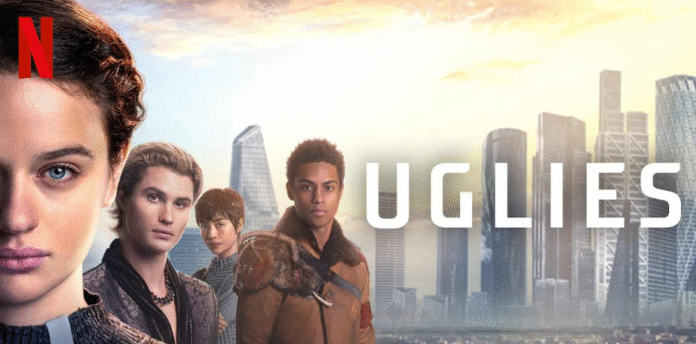By Darshini Dayanidhi
Uglies, a 2005 dystopian novel by Scott Westerfeld, recently got a movie adaptation. Directed by Joseph McGinty Nichol, the film premiered on Netflix on September 13, 2024. The movie is rated PG-13 and is marketed as a thriller with sci-fi elements. The main film stars include Joey King, Keith Powers, Chase Stokes, Brianne Tju, Jan Luis Castellanos, Charmie Lee, and Laverne Cox.
The plot is set in a dystopian future where society is divided between “Uglies” and “Pretties.” At the age of 16, every citizen undergoes an operation that transforms them into a “Pretty,” which is considered the ideal standard of beauty. The female main character, Tally Youngblood, eagerly awaits her 16th birthday and the chance to become Pretty. However, her friend Shay runs away to join a group of rebels who reject the societal standards of beauty. Tally is given an ultimatum: help the authorities find Shay and the rebels, or never become Pretty. As Tally infiltrates the rebel group, she starts to question the system and the true cost of beauty, realizing that the operation not only alters physical appearance but also the mind. Tally must decide whether to betray her friends, or fight against the controlling regime.
The Uglies film sends a message criticizing social beauty standards, conformity, and the vanishing sense of uniqueness. In the dystopian future, people must engage in surgery at the age of 16 to become “Pretty,” which represents society’s ideal of physical perfection. This parallels real-world demands to conform to strict standards of beauty, emphasizing the hardships these standards may bring. The movie explores the fixation with beauty and its influence on one’s identity, since the surgery not only modifies people’s appearances, but also affects their minds by removing individuality and critical thinking abilities. The filmmakers attempt to demonstrate the significance of self-acceptance and the perils of sacrificing one’s originality for society’s appreciation through the protagonist, Tally, who at first wishes to become “Pretty”, but eventually realizes the more profound implications.
On paper, the film sounds fantastic. It tries to convey important themes for young men and women alike, in a rapidly changing world where the social lens is getting narrower and narrower. However, the film has been bombarded with negative reviews from critics all over the country from the moment it was aired. Tbnweekly.com has stated that “As a film, Uglies is at best a bland, monotonous condensation of the book. More critically, the CGI is unimpressive, the social commentary is watered down, and some casting choices are inexplicable.”. Another reviewer wrote online, “The sequence of events that follows is rife with awkward exposition, preachy monologues, and implausible liaisons.” Lastly, an individual humorously commented, “The concept could’ve been good if the whole film wasn’t filled with more plot holes and inconsistencies than curdled milk.”
Many fans insist that the filmmakers have not done the original novel justice. Others declare the plot would have had the chance to be developed more if it had been turned into a TV show adaptation. This, it seems, is a repeated criticism that Netflix has endured throughout the years. The company’s management continues to make the error of adapting novels that require more screen time to engage with viewers into movies and adapting books that can satisfy viewers with the standard hour or two plot into shows. As for Uglies 2, it has yet to be officially confirmed. There is no trailer or teaser footage available for the film. Fans and critics alike are eagerly awaiting to see if the second movie will be an improvement from the first.

